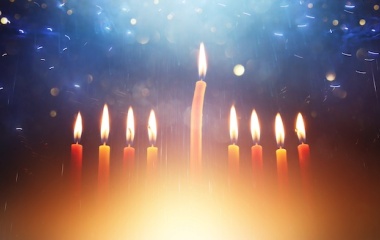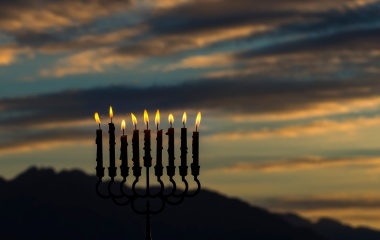
One of the painful realties of Jewish life is that the Jewish people are often judged by a double standard. What in other cultures is done with impunity often causes an uproar when it is the State of Israel doing the exact same thing. While frustrating and unfair, this is a burden of which we should be most proud.
The nations of the world have an innate ability to grasp the uniqueness of the Jew. How else to explain the fixation of the world on a people who make up less than one fifth of one percent of the world's population? It was Bilaam who best described the centrality and modesty of a Jewish home. What might be unnoticeable to us can make a deep impression on others.
The Jewish people have spent the last 3,500 years teaching the necessity for the highest of ethical standards, for going beyond the letter of the law, for putting the needs of others on par with our own. We have been a beacon of light in a world filled with much darkness. No wonder the rest of the world judges us by standards to which they may not even aspire.
As we recite Al Hanissim, we thank G-d for the victory of "the mighty into the hands of the weak, the many into the hands of the few, the impure into the hands of the pure, the wicked into the hands of the righteous and the immoral into the hands of those involved in Torah". While the miracle of the few defeating the many and the weak defeating the strong is readily apparent, of what relevance is the pure defeating the impure or of those who study Torah defeating the enemy? How does the fact that Jews study Torah make winning a war more miraculous?
A number of years back, I heard Rav Ahron Soloveitchik, zt"l, explain that when the righteous and the pure fight a war, winning is truly that much more difficult. We will not, and dare not, use the tactics of our enemies: intentionally killing civilians, targeting woman and children and attacking from such places as hospitals and schools. Jews would prefer to fight with honour and valour, even at great risk to their lives, rather than adopt the immoral tactics of the enemy. Fighting with one hand tied behind one’s back makes winning much more difficult and hence, miraculous, yet to do otherwise would make winning meaningless.
Unlike other Jewish holidays, the essence of the meaning of Chanukah was unclear, leading the Talmudic Sages to ask, "Mai Chanukah, what is Chanukah?” (Shabbat 21b). Rosh Hashanah and Yom Kippur are serious days of introspection, the Yamim Tovim of Pesach, Shavuot and Sukkot celebrate our national history and destiny, and Purim is a celebration of Jewish survival. But what is Chanukah?
The seemingly obvious explanation for Chanukah, the victory in the war and the rededication of the Temple, might explain the historical narrative of the Chanukah story, but does little to explain why we still celebrate Chanukah today. The miracle of the oil, the rededication of the Temple, and the military victory were all rendered irrelevant with the destruction of the Temple in the year 70.
“Not by might, nor by power, but by My spirit—said the Lord of Hosts” (Zechariah 4:6). In choosing this as the haftarah for Chanukah, our Sages were highlighting the fact that, while all things physical come and go[1], the spirit endures forever. That which is physical cannot be shared—if I share my chocolate bar with you, I am a nice guy, but I have less chocolate. Matters of the spirit can be shared without diminishing one’s portion. “A candle for one, a candle for one hundred”.
It is for this reason that we welcome Shabbat, the day of cessation from physical creativity, by lighting candles, and why Torah is compared to light. By sharing knowledge with others, one increases one’s own; “From my students [I learned] more than all others” (Taanit 7a). And it explains why we light a yahrzeit candle, demonstrating our belief in the eternity of the soul, even as the body is no longer.
When we light the menorah, we celebrate the eternity of the Jewish people, our survival against all odds. Despite many, too many, clouds of darkness over our long history, the Jewish people bring much light to the world, sharing so much with so many. We are literally an or legoyim, a light unto the nations.
The miracle of Chanukah may have been bayamim hahem, in those days, but there is much to celebrate b’z’man hazeh, in our days.
[1] It is because all things physical must die that the Rambam considers it heresy to believe that G-d has any physical qualities, claiming all such references are mere anthropomorphisms. While few would argue with the Rambam today, no less a figure than the Raavad objected to calling those who do believe such heretics, famously claiming that “many greater and better than he [the Rambam] went on this path” (Hilchot Teshuva 3:7).



